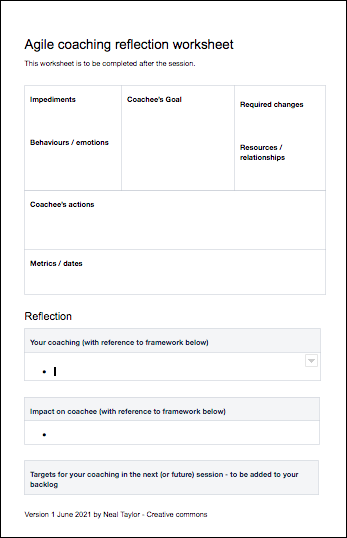“As Agile Coaches, we always tell others to reflect, but how often do we do it ourselves?”
– A cohort member during a recent an Agile Coaching Academy.
—
After completing an agile coaching course, many new Agile Coaches find themselves unsure about how to progress and improve. There is still a long and steep path to being able master all the skills and stances of an effective Agile Coach. Moreover, due to the nature of the role, all of these skills need to be simultaneously employed at any given moment during a coaching session or facilitation. The development path is neither linear nor sequential.
When I started this journey, I asked myself: how can I keep improving?
Essentially, I needed a time-boxed event after a coaching session to reflect, answer challenging questions and identify aspects to improve for next time.
Why worksheets?
To help me on my own path, I created some worksheets. I initially based the idea on my own experiences whilst training as a teacher. In teaching, one needs to master a wide range of skills till they become ‘second nature’ whilst working in a live and unpredictable environment – just like coaching. We used worksheets after a lesson to reflect on each of these skills. I created worksheets specifically for Agile Coaching
Download the Agile Coaching Worksheet

How can we improve as Agile Coaches?
Firstly we need to get into the habit of reflecting.
We need to reflect on a coaching session in a structured manner.
We need to keep our progress aligned to the requirements of a highly effective agile coach.
And we need to identify aspects to improve.
By targeting improvements, attempting them, reflecting and then adjusting, we are thereby also following an emprical process, in line with being agile.
I’ve been refining these worksheets over the past few months drawing on influences from my own teacher training experiences, from the agile methodologies, and what other agile practitioners have developed. I have been fortunate enough to receive input from some experts along the way.
I’m now making them available for anyone to use – or adapt – to their own needs.
This worksheet is to aid reflection after a coaching session or a facilitation. Any targets for improvement can be added to your own development backlog if you have one.
Three reasons to start reflecting from experts
- In the book, ‘How to make friends and influence people’, Dale Carnegie relates the story of a how one humble man with no formal schooling had become one of the most important financiers in America: “For years I have kept an engagement book showing all the appointments I had during the day. My family never made any plans for me on Saturday night, for the family knew that I devoted part of each Saturday evening to the illuminating process of self-examination and review and appraisal. … I asked myself: “what mistakes did I make,? – What did I do that was right – and in what way could I have improved my performance? – What lessons can I learn from that experience?” This system of self-analysis, self-education, continued year after year, did more for me than any other one thing I have ever attempted.”
- In the HBR article “Make Learning a Part of Your Daily Routine”, authors Tupper and Ellis explain: “The trouble is we don’t invest intentionally in everyday development – we’re so busy with tasks and getting the job done.” Deprioritizing our development is a risk career strategy because it reduces our resilience and ability to respond to changes happening around us.
The strategy is to: Learn from others, experiment, create a collective curriculum, unlearn, ask propelling questions and relearn.”
- In the book ‘You are what you risk’, Michele Wucker talks about the risk of stagnating in a role, and how the risk of stagnating is now a bigger risk than actually losing the role! “the ability to switch careers and acquire new skills will be the biggest advantage anyone can have to succeed in the new economy, no matter if they are working for companies or for themselves.
The most successful careers will involve the kind of skills that humans possess but machines do not: strategy, empathy, teamwork, innovation, creativity, and the ability to deal with unpredictable situations. And to keep up with the future, people will need to invest in themselves.”
“Adaptive and proactive learners are highly prized assets for organisations.”
